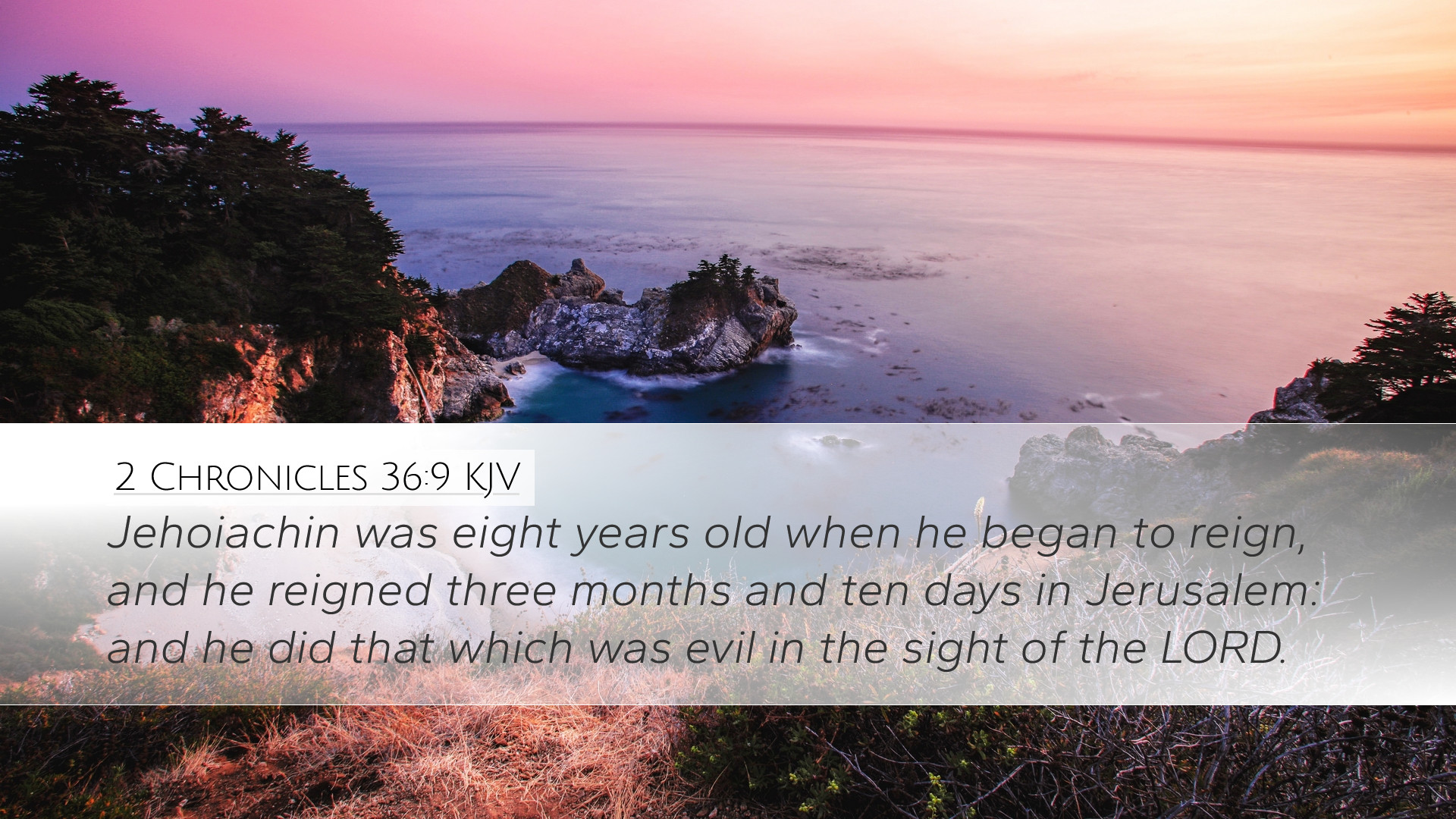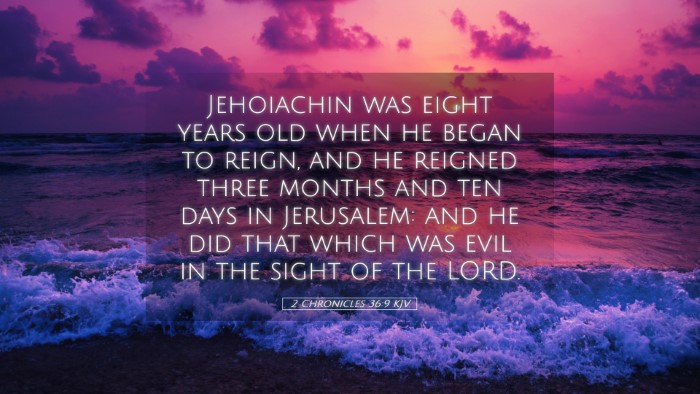Commentary on 2 Chronicles 36:9
Verse: "Jehoiachin was eight years old when he began to reign, and he reigned three months and ten days in Jerusalem: and he did that which was evil in the sight of the Lord."
Introduction
This verse recounts a poignant moment in the history of Judah, highlighting the reign of Jehoiachin, a king whose brief tenure exemplifies the moral and spiritual decline of Israel during this period. The commentaries of noted scholars such as Matthew Henry, Albert Barnes, and Adam Clarke provide deep insights into the implications of this verse for understanding the character of leadership, the nature of evil, and God's judgment.
Historical Context
Historical Significance: Jehoiachin ascended to the throne at a remarkably young age during a tumultuous time marked by the Babylonian threat. This commentary sheds light on the context surrounding his rule and the factors contributing to the downfall of the kingdom.
- Matthew Henry: Highlights the vulnerability of Judah under foreign dominion and the significance of a young king amidst political chaos.
- Albert Barnes: Explains that Jehoiachin's reign was technically recognized, despite his youth and the ongoing crisis.
- Adam Clarke: Adds that his youth portrays the lack of stability in leadership, setting the stage for future calamities.
The Character of Jehoiachin
Moral Evaluation: The brief description of Jehoiachin’s reign as "evil in the sight of the Lord" serves as a crucial indictment not only of his character but also of the surrounding culture.
- Matthew Henry: Emphasizes the importance of personal integrity in leadership, questioning how an eight-year-old can lead well when lacking moral and spiritual guidance.
- Albert Barnes: Points out that even at a young age, ethical decisions are paramount, which Jehoiachin failed to uphold.
- Adam Clarke: Reflects on the consequences of a morally absent leadership and how it affects national spiritual health.
Comparative Analysis
Contrasts with Previous Kings: Jehoiachin’s reign is often compared with other rulers of Judah, particularly his father, Jehoiakim, and the previous kings.
- Matthew Henry: Notes that Jehoiachin's evil ways continued the legacy of idolatry and sin that had become rampant in Israel.
- Albert Barnes: Suggests that his short reign represents not only personal failure but also the collective failure of the nation to adhere to Yahweh.
- Adam Clarke: Argues that the recurring themes of evil reigns lead to eventual destruction, a historical lesson for nations today.
Theological Implications
Divine Judgment: The phrase "did that which was evil in the sight of the Lord" carries profound theological implications, suggesting a direct relationship between national leadership and divine blessing or judgment.
- Matthew Henry: Points to divine standards that leaders must meet, warning that neglecting them invites God’s wrath.
- Albert Barnes: Emphasizes that God’s displeasure is inevitable when leaders choose the path of wickedness.
- Adam Clarke: Reflects on the broader implications of moral decay within leadership and the subsequent effects on a society's fate.
Lessons for Today
Relevance to Contemporary Leadership: This verse serves as a reminder to pastors, leaders, and students of theology about the critical nature of godly leadership.
- Matthew Henry: Urges present-day leaders to adhere to biblical principles to avoid similar pitfalls.
- Albert Barnes: Invites careful introspection, highlighting the impact of personal morality on broader community welfare.
- Adam Clarke: Stresses the need for righteous leaders as a bulwark against societal decay.
Conclusion
The reign of Jehoiachin, as encapsulated in this succinct verse, serves as a grave reminder of the potential for evil when leadership is devoid of divine guidance. The insights drawn from public domain commentaries offer profound reflections on the nature of authority, morality, and divine judgment, compelling contemporary audiences to seek righteousness and integrity as foundational aspects of leadership in all spheres of life.


